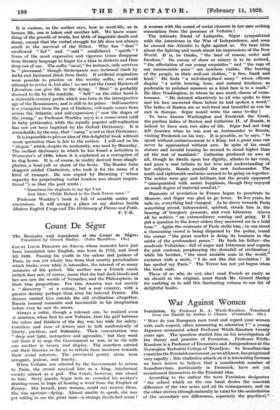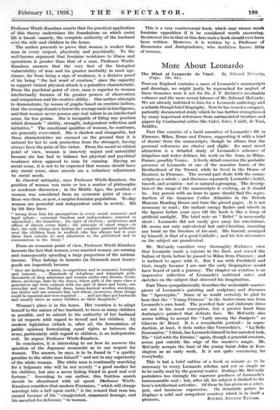War Against Women
" WRY do you European men treat and regard your women with such respect, often amounting to adoration ? " a young Japanese economist asked Professor Wieth-Knudsen twenty years ago. The question started him on his investigation of the theory and practice of Feminism. Professor Wieth- Knudsen is a Professor of Economics and Jurisprudence at the Norwegian Technical College of Trondjem. In Scandinavian countries the Feminist movement, as we all know, has progressed very rapidly ; this vindictive attack on it is interesting because we have reason to believe that a considerable number of Scandinavians, particularly in Denmark, have not yet accustomed themselves to the Feminist idea.
According to the author the term Feminism designates " the school which on the one hand denies the essential difference of the two sexes and all its consequences, and on the other strives (though naturally in vain) for the assirniLation of the secondary sex differences, especially the psychical." Professor Wieth-Knudsen asserts that the practical application of this theory undermines the foundations on which social life is based—namely, the complete authority of the husband over the wife and childien in the home.
The author proceeds to prove that woman is weaker than man in every respect, physically and psychically. To the well-known argument that feminine resistance to illness and operations is greater than that of a man, Professor Wieth- Knudsen answers that the very fact of the biological vulnerability of man and his greater mortality in most age- classes, far from being a sign of weakness, is a decisive proof of his being " the last word of creation," since the capacity to support violent physical attack is a primitive characteristic. From the psychical point of view, man is superior to woman intellectually because of his greater powers of observation and comparison and his creative ability. Our author attempts to demonstrate, by means of graphs based on cerebral indices, that the average female is below the average male in intelligence, and that women never possess any real talent in an intellectual sense, far less genius. She is incapable of filling any position which demands " ability, strength, independent reflection and initiative." The emotional qualities of woman, he continues, are generally over-rated. She is shallow and changeable, but these characteristics are excused on the ground that it is natural for her to seek protection from the strongest, having always been the prize of the victor. From the moral or ethical point of view, woman is innately unjust and untruthful because she has had to balance her physical and psychical weakness when opposed to man by cunning. Having no social sense, it is not to be expected that woman should have any moral sense, since morals are a voluntary adjustment to social needs.
In classical antiquity, says Professor Wieth-Knudsen, the position of women was more or less a matter of philosophic or academic discussion ; in the Middle Ages, the position of women was considered from an economic point of view— there was then, as now, a surplus feminine population. To-day women are powerful and independent units in society. Bit by bit they have
" wrung from him his prerogatives in every social, economic and legal sphere : economic freedom and independence, married or unmarried ; the franchisethe right of election ; professions and offices of almost every kind ; the principle of equal wages—in fact, the only things now lacking are complete parental authority over the children born in wedlock (she has always had it over those born outside it) and admission to the priesthood and to commissions in the Army."
From an economic point of view, Professor Wieth-Knudsen laments the fact that women, even married women, are earning and consequently spending a large proportion of the nationa income. They indulge in luxuries (in Denmark most luxury goods are imported) because
" they are lacking in sense, in experience and in economic foresight and interest. . . . Hundreds of telephone and telegraph girls, thousands of shop assistants and women clerks own dresses, boots, shoes, stockings, hats by the dozen, where girls of the same class a generation ago were content with one pair of shoes and boots, one everyday and one Sunday dress, home-knitted woollen stockings, one winter and one summer hat, and where, moreover, these things could be repaired and were repaired . . . and yet they got husbands and usually twice as many children as their daughters."
Woman's place is in the home. Her vocation is to adapt herself to the nature of her husband, to have as many children as possible, and to submit to the authority of her husband in all respects with regard to herself and her children. All modern legislation (which is, after all, the formulation of public opinion) formulating equal rights as between the sexes, particularly with regard to children, is an indisputable evil: So argues Professor Wieth-Knudsen.
In conclusion, it is interesting to see how he answers the question of the Japanese economist as to our respect for women. The answer, he says, is to be found in " a quality peculiar to the white man himself " and not in any superiority of the white woman. The white man is continually searching for a helpmate who will be not merely " a good mother for his children, but also a never failing friend in good and evil fortune." According to our author, this fruitless search should be abandoned with all speed. Professor Wieth- Knudsen considers that modern Feminism, " which will change marriage into a hell upon earth," is the reward that man has earned because of his " exaggerated, unnatural homage, and his uncalled-for deference " to woman. This is a very controversial book, which may arouse much feminine opposition if it be considered worth answering. Its interest lies in that at this date such a book should ever have been written. However, it is written by a Professor of Economics and Jurisprudence, who doubtless knows little of women.







































 Previous page
Previous page